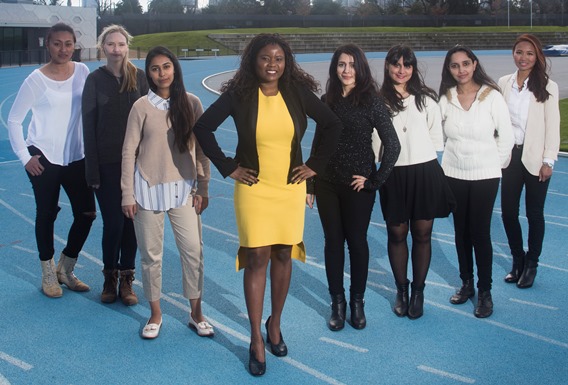'Date My Race' (Photo credit: Shannon Morris).
Airing tonight as part of SBS’ Face Up To Racism week, Matchbox Pictures' doco Date My Race explores the role that race plays in online dating. Through experiments and interviews with experts, the show explores whether having a racial preference about a potential partner amounts to racism.
Date My Race is led by presenter and SBS journalist Santilla Chingaipe, a Zambian-Australian. She said Matchbox approached her for the gig because she’d been “quite vocal” about her belief that race was a factor in her lack of online dating success. The show takes her through experiments that test her suspicions.
“I haven’t had the most pleasant of experiences with online dating. It just made sense to go on this journey to figure out exactly why I wasn’t doing so well,” Chingaipe told IF.
“Before the show, I’d suspected it but I used to think it can’t be that – maybe it’s just the photos I’m putting up, or maybe I’m not showing enough boob. It’s just mind-boggling that some people would discriminate based on skin colour. But going on the show reinforced that actually I wasn’t paranoid; that it was real.”
While Chingaipe said she probably won’t try online dating in Australia again, she was surprised to learn that most people weren’t conscious of the fact that they excluded potential partners based on race.
“I just assumed that if you’re going to make such a big decision, that you’d be interrogating it. But then I found out that actually, not a lot of people did,” she said.
Producer Naomi Elkin-Jones said the larger aim of Date My Race is to get people to think more consciously about why they make the choices they do, noting decisions on dating apps like Tinder are so often made quickly and absent-mindedly.
“You’re not necessarily aware of what your preference is until someone questions you on it,” said the producer, who shot the show over 10 weeks with director Nick McInerney, whom she previously worked with on Revolution School.
“It’s not a serious ‘are we racist’ documentary – it’s actually saying, if you’ve got a racial preference, where does it come from?,” Elkin-Jones told IF.
While Chingaipe’s experiences online were a starting point for the documentary, the producer's challenge was making sure they also looked at the issue of race and dating more broadly.
On the show, Chingaipe enlists four people with stated racial preferences to use a ‘Colourblind’ dating app, where they pick someone to go on a date with based off interests and personality alone; there are no profile photos. The app was designed by Elkin-Jones, McInerney and EP Susie Jones.
“We developed it as a team and thought about the key things that we would be happy to see on the page – that might still give enough information for the person to connect but took race out of the equation,” said Elkin-Jones.
Finding participants who would talk openly about racial preferences on camera was a challenge, said the producer.
“It’s something that people don’t like to talk about, because essentially they’re either afraid or they don’t necessarily realise that they have a preference,” said Elkin-Jones.
Chingaipe commended the participants’ honesty. “It’s not easy to go on national television with strong views; very much aware you might receive some kind of backlash. But these people… they weren’t necessarily happy with where they sat with things and they wanted to understand [it] a little bit better."
And even though Chingaipe said the issue was personal for her, she still went into the documentary as a journalist. “The bigger issue was race and trying to understand that.”
The production team didn’t want to reveal too much to Chingaipe about the cast prior to meeting them. “The great thing about Santi is when someone says something potentially shocking to her, she doesn’t react in a way where she shows her emotions,” Elkin-Jones said.
“She just comes back with a question and pulls that person up on it. We were lucky because we were able to trust that she would follow through on the things that they were saying and she wouldn’t just let it slide.”
Overall, Chingaipe said making the documentary caused her to realise Australia wasn't having conversations around race more generally.
“I think for many people, the way in which they understand racism is very much in that overt KKK style, where you say horrible things to a certain group of people. But what I found is that racism manifests itself in different ways: there’s institutional racism, there’s systemic racism, and the interpersonal relationships that we have."
“Some people aren’t even aware of it. That doesn’t necessarily make people bad; it’s just that we’re not interrogating [it], we’re not having these sorts of conversations.”
In that vein, she hopes SBS' Face Up to Racism Week inspires discussion. “Once we get past that point of discomfort with the ‘r’ word, we can start to genuinely look to finding solutions around how we make things better, how we ensure that certain things don’t continue to happen.”
http://www.sbs.com.au/programs/fu2racism
'Date My Race' airs tonight (Monday 27) on SBS at 8.30pm. It is also available on SBS On Demand.


